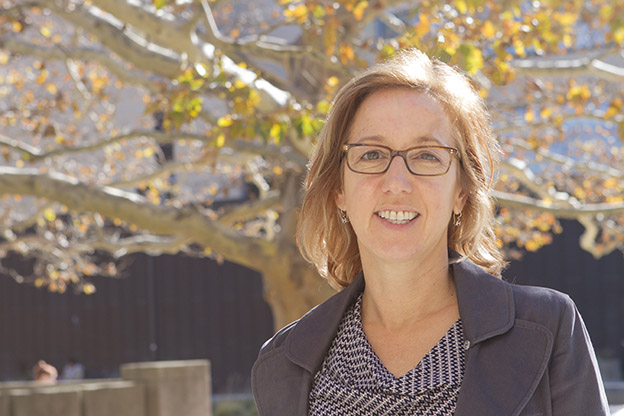Can you trust your watch? New Asper Chair keeps a wary eye on what emerging technology is telling us

Patrolling the invisible borderline where helpful technology becomes intrusive technology is but one of the many pursuits Paula Gardner is taking on in her new role as Asper Chair in Communications.
Gardner has arrived at McMaster with many goals and the experience and credentials to take them all on.
Having served most recently at OCAD University, Gardner specializes in media studies and feminism, and has focused her scholarship in communications theory and practice on subjects as varied as TV and video production, art and design, the immigration and refugee experience, dance, technology and physical therapy.
“Dr. Gardner is well suited to fill the role of the Asper Chair,” says Dean of Humanities Ken Cruikshank. “Her research bridges the work in critical analysis, creative expression and community engagement that are a hallmark of our Faculty. We are particularly excited by her ongoing work with community, industry and health care partners in addressing issues of human rights and social justice.”
As she starts her term as Asper Chair, the genial Gardner is keenly interested in understanding whether the technology we so eagerly embrace for monitoring and guiding our fitness, health and daily activities is truly improving our lives or eroding our independence and individuality.
“In this new age, where we’re all using digital technology, getting under the hood and understanding how it works is really empowering,” she says. “From a political point of view, I feel that level of intervention is really crucial, so that you understand how your data is being captured, what kind of data it is and how data is being turned into information.”
Do we really understand our own brainwaves, digestion and heart rhythms well enough, for example, to allow overgrown wristwatches to tell us when to take a drink of water or when to go to bed?
“I think it’s potentially dangerous if we get into the habit of allowing machines to predict our health futures, our physiological futures and our emotional futures, and tell us how to respond to them,” she says. “We’re living in the age of convenience, but at what cost?”
Gardner has recently been working with a rehabilitation scientist and a computer scientist to develop an exercise system that provides automatic feedback to seniors dealing with dementia, social isolation and depression and lack of movement.
She says the opportunity to do interdisciplinary research attracted her to McMaster.
“I’m really happy to be in this diverse environment at a leading research institution,” she says. “It’s really quite a thrill.”


